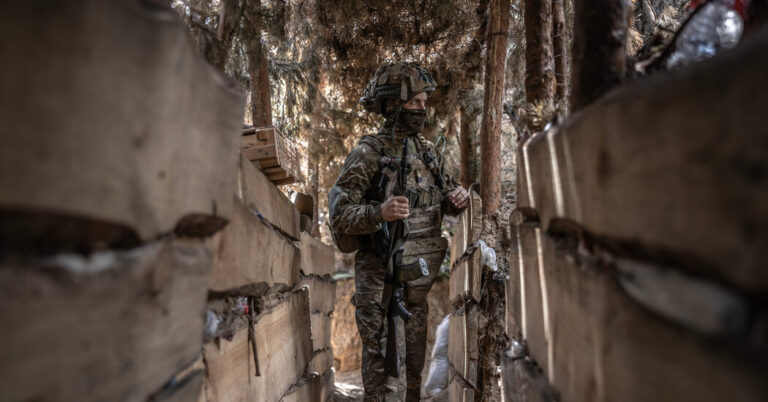Ukraine’s President Volodymyr Zelensky pushed for diplomatic efforts Saturday to reopen the Black Sea to Ukraine’s grain shipments, taunting the NATO chief a day after discussing with Turkey’s president the collapse of a deal allowing ships to bypass the Russian blockade.
Moscow pulled out of the one-year deal, a rare agreement between Russia and Ukraine brokered by Turkey and the United Nations. Efforts to revive it have fallen into disarray, as Russia has pounded Ukrainian ports, hit grain stores and other infrastructure, and vowed it would treat commercial ships in the Black Sea as potentially carrying military cargo.
“Because of Russia’s actions, the world is once again on the brink of a food crisis,” Mr. Zelensky wrote on Twitter late friday “A total of 400 million people in many countries in Africa and Asia are at risk of starvation. Together, we must avoid a global food crisis.”
Turkey’s president, Recep Tayyip Erdogan, has been the main mediator between Russia and Ukraine since the massive invasion began in February, standing out among his NATO allies by maintaining close ties with Russian President Vladimir V. Putin. Mr. Erdogan is expected to meet with Mr. Putin next month.
Mr. Zelensky said he discussed prospects for peace with Mr. Erdogan and asked for help in returning prisoners of war, particularly members of the Crimean Tatar ethnic minority.
During the meeting, President Erdogan “said that Turkey has put in great efforts to achieve peace,” the Turkish presidential office said. said on Twitteradded that Friday’s call took place at Kyiv’s request.
On Saturday, said Mr. Zelensky that he and the general secretary of NATO, Jens Stoltenberg, discussed the “priorities and future steps necessary for the unblocking and sustainable operation of the Black Sea grain corridor.”
Russia has said it will renew the agreement, but only if other countries lift the sanctions they imposed in response to its invasion of Ukraine, a move that is unlikely. Moscow says the deal was unfair to Russia and forced its producers to sell grain and other agricultural products at below-market prices.
On Friday, Mr. Erdogan told reporters that Russia wanted the grain corridor to remain, “but there are certain expectations from Western countries, and they have to act.” He said he would discuss the issue with Mr. Putin on the phone and when they meet next month.
Moscow’s decision to end the accord came just days after the Turkish leader held a heated meeting with President Biden and said Ukraine deserved “NATO membership without doubt,” a move that could potentially strain relations with Mr. Putin, who blamed NATO expansion, in part, for his decision to attack Ukraine, and raised questions about the possibility of reviving the deal.
Secretary of State Antony J. Blinken, speaking at the Aspen Security Forum in Colorado on Friday, accused Russia of “weaponizing food supplies” and said it would be “very difficult” for Ukraine to continue sending grain and other food products.
Tensions have also risen in the region after Monday’s attack on the Kerch Strait Bridge, which links Russia to the occupied Crimean Peninsula, which killed two civilians. Crimea was a key staging area when Mr. Putin ordered the massive invasion of Ukraine and remains a key logistics hub for its war. Kyiv has carried out increasingly bold strikes on the peninsula, though it has neither confirmed nor denied responsibility for the bridge attack.
On Saturday, a drone attack on an ammunition depot on the peninsula prompted authorities to evacuate a three-mile radius and temporarily suspend some transportation, the Moscow-installed regional governor said Saturday.
The governor, Sergei Aksyonov, reported no injuries or casualties. Video shared by Russian state media showed thick clouds of smoke. The footage could not be immediately verified. military of Ukraine a strike is confirmedsaying it destroyed an oil depot and warehouses.
In a video address to the Aspen Security Forum, an annual national security conference, Mr Zelensky said on Friday that the Kerch Strait Bridge was a legitimate target for Ukraine and should be destroyed.
“The goal is to return the whole of Crimea, because it is our sovereign territory,” he said. “The Kerch bridge is not a small logistical road. It is used to transport ammunition and militarize the Crimean Peninsula.”
Mr. Zelensky also acknowledged that his country’s counteroffensive against entrenched Russian troops is progressing more slowly than expected because the operation got off to a late start.
“We had a plan to start it in the spring, but we didn’t, because, frankly, we don’t have enough ammunition and weapons and not enough trained brigades. I mean, properly trained in these weapons,” said Mr. Zelensky.
The late start, he said, “gave Russia time to mine all our land and build some lines of defense.”
Russia has had months to prepare for the counteroffensive, and the front is littered with mines, tank traps and dug-in troops, while Russian reconnaissance drones and attack helicopters fly overhead more frequently.
Near the front line in southern Ukraine, Russia’s Defense Ministry said a journalist of the RIA Novosti news agency was killed and three other journalists were wounded in a shooting on Saturday. The ministry claimed that Ukrainian forces launched an attack using cluster munitions.
Russia has not provided evidence of the claim and it cannot be independently confirmed. Ukrainian officials did not immediately comment. US officials said this week that Ukrainian forces had begun using American-made cluster munitions against Russian defensive positions. For most of the war, Russia and Ukraine used such munitions, which were banned by many of America’s closest allies.
Eric Schmitt contributed reporting from Aspen, Colo.
